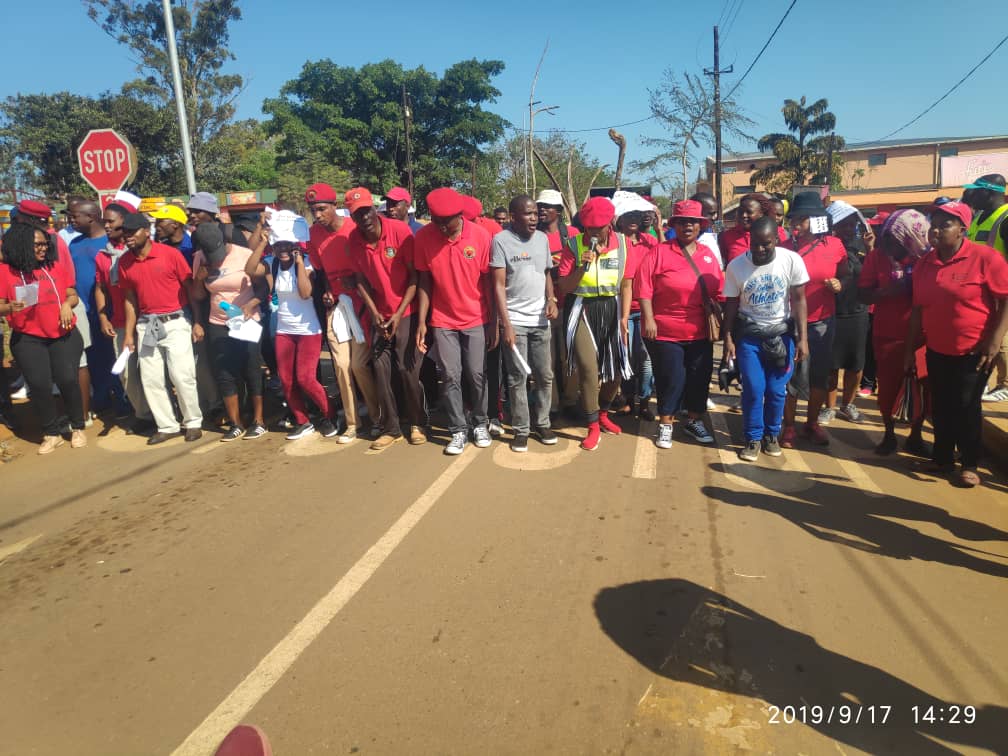GOVERNMENT will deploy police officers to be everywhere during the proposed strike action to ensure peace to people who will want to work.
This was said by Ministry of Education and Training Principal Secretary (PS) Bertram Stewart yesterday at the Parliament Conference Room.
Stewart emphasised that government would continue effecting the no-work-no-pay rule, if the strike continued.
The PS said the police would be there to ensure safety among those who engaged in the strike and those that decided to go to work during the protest action. Stewart said government was aware that some perpetuators of strikes had a tendency of intimidating those who were not in favour of the strike.

He said those who were not in favour of the strike have a right to hold that view and they did not have to be intimidated or beaten as they exercised that right. The police would be there to protect those people as well.
Stewart pleaded with teachers in particular that they should remember that as they exercised their rights, they should also remember that children looked up to them for their safety and well-being.
“Many parents are at work and they have entrusted teachers with the upbringing of their children. We plead with teachers to ensure that the children are also safe,” Stewart said.
Stewart said government was aware that civil servants had a right to go on a legal strike. Government, on the other hand, according to the PS, was also aware of its right to withhold payment to its workers that would decide not to go to work.
Stewart said they had issued some registration forms to school principals. The forms will be used by the school principals to register all teachers who would be present and absent. Those forms will be used by principals and government to keep track of the workers who reported for duty and those who did not.
According to Stewart, this was an agreement between government and the principals after a meeting they held at Prince Mfanyana Hall in Manzini. Stewart said they also talked about other matters at Prince Mfanyana, which included the free primary education (FPE). The PS admitted that the late payment of FPE grants was a mistake of the government and promised the principals that they would sort out the issue. He further said they would map a convenient way to communicate with the principals on how they would work together to provide services on time in schools.
We are in a difficult position, says EPA
As the looming massive strike action draws closer, school principals find themselves between a rock and a hard place.
This was said by Eswatini Principals Association (ESWAPA) President Welcome Mhlanga. The president said it was true that they agreed with government to monitor the presence and absence of teachers in schools. It was the difficult position that forced them to do so. Mhlanga said people should consider that as principals, they were also civil servants. They also had a great interest in the cost of living adjustment (CoLA). However, their position was not the same as that of teachers.
As principals, they had a core responsibility of ensuring the running of schools on a daily basis. If the schools did not operate well, the blame would be put squarely on them. If they decided to take to the streets to protest on the issue, it would be easy for everyone under them in schools to use them as an excuse for not being at work.
He said their position as principals came in many forms, as they represented interests of different stakeholders in their schools.
They represented parents, teachers and the children and they had to make sure that all those people were happy because their interests were well represented.
Mhlanga said it would be unfair for them to leave schools after they had been forcing parents to pay money for their children to study.
He further stated that if schools would not operate, government would easily deal with them because they were smaller in number than the teachers.
“If the school does not run, all the subordinates will put the blame on the school manager, which is the principal and government would easily deal with me here because I am the only manager in the school. I usually tell the teachers that they should try and understand the position we are in as principals.
I understand that they will never fully understand it because they are not where we are now, but they should at least empathise,” Mhlanga said.
It was for this reason that principals have agreed to fill up the forms and this was because they wanted the school to run.
He said he heard some other people saying their organisation was in bed with government yet that could not be the case.
He also stated that they talked aboutthe other issues that concerned the FPE and food in schools. He said government was working towards keeping its promise in that regard.
Article sourced from Swazi Observer


